

Dr Beukes (CEMIS, US), Dr S Bachmann (BU) and Prof Liebenberg (CEMIS, US)
Latest research and knowledge exchange news at Bournemouth University


Dr Beukes (CEMIS, US), Dr S Bachmann (BU) and Prof Liebenberg (CEMIS, US)
The chapter is called, “Interplay between lipid mediators and the immune system in the promotion of brain repair”, and looks at the interactions of omega-3 and omega-6 fatty acids with endocannabinoids in neuroinflammation, neurogenesis and brain aging.
The brain is highly enriched in docosahexaenoic (DHA) and arachidonic (ARA) acids, omega-3 and omega-6 polyunsaturated fatty acids (PUFAs), respectively. DHA and other long-chain omega-3 PUFAs are precursors of anti-inflammatory and pro-resolving mediators, whereas ARA is precursor of inflammatory eicosanoids, but also pro-resolving mediators. The endocannabinoid system comprises a group of bioactive lipids, receptors and enzymes involved in their synthesis and degradation. 2-archidonoylglycerol (2-AG) and anandamide (AEA) are the primary agonists of cannabinoid receptors in the brain, substrate for enzymes such as cyclooxygenases, lipoxygenases and cytochrome P450 mixed function oxygenases, which release ARA upon hydrolysis. The aging brain has impaired ability to balance protective and detrimental effects of the immune system and chronic low-grade neuroinflammation is a contributor to cognitive impairment and development of neurodegenerative diseases. There is a complex interplay between omega-3 and omega-6 PUFAs, the endocannabinoid system and the immune system. This chapter summarises current evidence of this interplay and discusses the therapeutic potential in the promotion of brain self-repair.
Dr Simon Dyall’s Bioactive Lipids Research Lab conducts research investigating the role of bioactive lipid mediators in brain protection and repair across the lifespan and following neurotrauma.
The book, Role of the Mediterranean Diet in the Brain and Neurodegenerative Disease” is edited by Farooqui T. and Farooqui A., and is due for publication 1st November 2017 by Academic Press. Paperback ISBN: 9780128119594
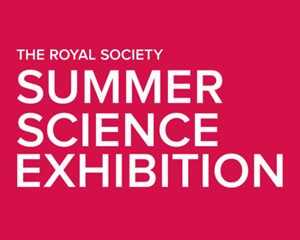 The Royal Society is looking for brilliant science and scientists to feature at the Summer Science Exhibition 2018.
The Royal Society is looking for brilliant science and scientists to feature at the Summer Science Exhibition 2018.
The Exhibition features the UK’s most inspiring research and is a chance for scientists to showcase their work to over 14,000 people, including everyone from school children and families to MPs and Fellows of the Royal Society. Exhibitors are supported throughout the process and get dedicated support, advice and guidance from our Exhibition team.
It’s a great event to be part of, but as our motto (Nullius in verba) urges, don’t take our word for it. A 2017 exhibitor said:
“The whole week of the exhibition was fabulous. All our team thoroughly enjoyed the event and it has been a memorable experience for us. We have learned a lot from this.”
The call for proposals closes on 1 September 2017 and the Exhibition will run from 2 – 8 July 2018.
If you are interested in finding out more or applying, please visit this website: https://royalsociety.org/science-events-and-lectures/2017/summer-science-exhibition/proposals/.
Please direct all enquiries to exhibition@royalsociety.org.
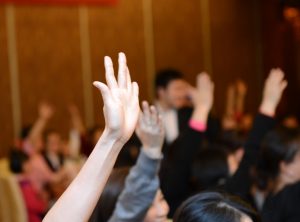
Public engagement team is currently looking for speakers for U3A Public Lectures day taking place on Monday 11th September at EBC.
The University of the Third Age are a community of retired/ semi retired people who enjoy the reward of learning and take part in regular groups and sessions to expand their skills and life experiences.
They are very enthusiastic audience so be prepared for lots of questions and interesting discussion about your research.
We are looking for talks that fit into the history theme as we’re inviting Boldre Parish Historical Society to join us, but if your research is not directly related we’d still love for you to be involved!
This is a half day event, however we only ask for you to be there for duration of your talk (30-40 minute talk followed by Q&A session)
If this sounds like something you would like to do or know someone who may be interested, please drop us an email – fol@bournemouth.ac.uk
We’re looking forward to hearing from you!
The FAR project webpages have now been published.
BU’s pioneering Fair Access Research project has brought together students, SUBU, professional, service and academic staff from across the university to develop and expand expertise and reflexive practice in the field of fair access to higher education.
Each member of the team has brought different knowledge and experiences to a series of innovative research projects exploring what it means to be a ‘non-traditional’ student in the 21st century. FAR has inspired new ways of thinking about fair access and widening participation through this ‘whole institution approach’,
The team has explored all the different stages in the student lifecycle developing an understanding of the challenges some students face in accessing or succeeding at university, how university is experienced by diverse groups of students and how the university can support them in the optimum way when they are here.
Explore the five themes of the FAR programme on the webpages at https://research.bournemouth.ac.uk/project/fair-access-research-and-practice-far/
Outreach

Contact principal investigators Dr Vanessa Heaslip or Dr Clive Hunt for further information
Hi, my name is Holly Coombs.
I am currently doing a research placement at Bournemouth University as part of the Nuffield programme, which gives people at the end of their first year of A-levels a chance to work with professionals in science based professions.
Alongside PGR Francesco Ferraro, I have been predominantly working on his study on inspiratory muscle training and how by using a device called POWERbreathe is possible to improve inspiratory muscles strength.
I will be at Bournemouth University for four weeks where at the end I am going to write a report that will hopefully be published by the Young Scientist Journal.
My report is going to be on the Timed Up and Go test (TUG). It is going to include information about what the TUG test is, as well as how it can help us to predict falls and measure stability.
My whole aim of this placement is to gain research skills that will help me later in life as I intend to pursue a medical career.
On the 20th July, I got the chance to use two surgical simulators:
The Orthopaedic Research Institute (ORI) contains the Ossim SimK total knee replacem ent simulator, and the VirtaMed knee arthroscopy. This is the only lab in Europe where the two simulators are together.
ent simulator, and the VirtaMed knee arthroscopy. This is the only lab in Europe where the two simulators are together.
Indeed, the ORI produces high-quality research which helps doctors and students to understand and learn more about many fields, including orthopaedic surgery, knee and hip replacements. With the aid of Shayan Bahadori (Orthopaedic Research project manager), I progressed from drilling holes into a piece of woods to trying a full knee replacement. Next, I got to try my hand at a knee arthroscopy which I found very challenging.
From trying these surgical simulators, I have learned that perseverance and resilience are essential. At first, I found that even  just drilling holes into a piece of wood using the simulator was incredibly hard. However, as I used and practiced the simulators more, I could feel myself improving and progressing in the fundamental skills required.
just drilling holes into a piece of wood using the simulator was incredibly hard. However, as I used and practiced the simulators more, I could feel myself improving and progressing in the fundamental skills required.
This is a valuable experience to have gained as it is essential for all careers, not just medical ones.
In conclusion, continuing my placement, I hope to assist in the carrying out of respiratory muscles tests and I hope that by the end of my internship I will have a greater understanding of what it takes to conduct a research study and also how the data collected can be used and analysed.
Kun Qian is a PhD candidate in the National Centre for Computer Animation, Faculty of Media and Communication. He has been working on computer graphics, game, vfx and virtual reality technologies for more than 10 years. He will deliver a talk on his research of surgery simulation at 7pm, 25th July at K103, as part of the BCS Animation and Game Development SG event. The detail can be found at http://www.bcs.org/content/ConWebDoc/58181 . It is free for all the attendees, everybody is welcome. Please register at the link above, because we will bring some refreshment based on the number of registrations.
Abstract: With the development of computer graphic and haptic devices, training surgeons with virtual reality technology has proven to be very effective in surgery simulation. Due to the various unsolved technical issues, the laparoscopic surgery simulation has not been widely used. Such issues include modelling of complex anatomy structure, large soft tissue deformation, frequent surgical tools interactions, and the rendering of complex material under the illumination. A successful laparoscopic surgery simulator should integrate all these required components in a balanced and efficient manner to achieve both visual/haptic quality and a satisfactory refreshing rate. In this talk, we propose an efficient framework integrating a set of specially tailored and designed techniques, ranging from deformation simulation, collision detection, soft tissue dissection and rendering. This framework can be used as a low level engine for surgery simulation by integrating and optimizing modern creative technologies.
Dr. Xiaosong Yang, MBCS
Associate Professor of Computer Animation
National Centre for Computer Animation
Faculty of Media and Communication
Bournemouth University
http://staffprofiles.bournemouth.ac.uk/display/xyang
Dr Elvira Bolat from the Department of Marketing at the Faculty of Management has been awarded the prestigious Academy of Marketing Research Fund.
Her research titled ‘From Compassion to Defence: Exploring Service Brands’ Trust Repair Mechanisms across Traditional and Digital Media’ is the sub-project of the Faculty of Management’s QR-funded project on Trust Repair in the service sectors, led by Dr Julie Robson. 
Using integrative content analysis and emotional text analysis, Dr Bolat’s project will explore the trust repair process and trust repair mechanisms used in the context of traditional and digital media, within selected high profile trust erosion cases in the service sectors. Dr Robson (Department of Marketing, FM), Professor Juliet Memery (Department of Marketing, FM) and Dr Caroline Jackson (Department of Leisure and Events, FM) are acting as mentors for the project and advising on the contextual setting of the study.
Moreover, this project supports Dr Bolat in acquiring new skills in quantitative analysis of qualitative data and deepening understanding and use of language processing software.
Dr Bolat comments: “Academy of Marketing is one of the biggest international organisations to support marketing scholars and to be one of the few recipients of this prestigious funding scheme is an absolute honour. This also helps our QR project to extend its impact and reach.”
To find out what other projects are recipients of this year’s Academy of Marketing Research funding scheme, access: https://www.academyofmarketing.org/research/amrc-research-funding/
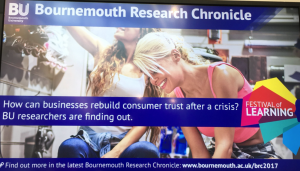 Trust Repair team has delivered a successful Festival of Learning 2017 event on 11 July titled ‘Lies and Scandals: Whatever happened to Trust?’ and received an overwhelmingly positive feedback from the audience. Once of things that came out of this interactive event is a powerful impact media has on stakeholders’ interpretation of organisational transgressions and, therefore, on ability of brands to repair trust damage. Hence, this sub-project will help in extending scholar’s and practitioners’ understanding on role of both traditional and digital media play in repairing trust towards brands.
Trust Repair team has delivered a successful Festival of Learning 2017 event on 11 July titled ‘Lies and Scandals: Whatever happened to Trust?’ and received an overwhelmingly positive feedback from the audience. Once of things that came out of this interactive event is a powerful impact media has on stakeholders’ interpretation of organisational transgressions and, therefore, on ability of brands to repair trust damage. Hence, this sub-project will help in extending scholar’s and practitioners’ understanding on role of both traditional and digital media play in repairing trust towards brands.
This grant is a very positive recognition of BU’s standing internationally and nationally within marketing and consumer behaviour research and contributes towards a growing impact generated by Influences on Consumer Behaviour research centre.
To connect with Dr Bolat, email at ebolat@bournemouth.ac.uk or tweet at @Elvira_MLady
To follow Trust Repair project, tweet at @TrustRepairBU
Sport management researcher Dr Tim Breitbarth (Department of Sport & Physical Activity) was one of only six awardees of the prestigious UEFA Research Grant Programme 2016/17, which supports all 55 UEFA member associations to further develop their own activities and projects. Tim’s project entitled “#SocialResponsibility in #Football: Mapping Perceptions and Expectations through Social Media Conversations across Europe”, is a longitudinal, large-scale analysis of social media across ten languages.
Besides delivery of interim and final reports, Tim was invited to the House of European Football (UEFA’s headquarter) in Nyon, Lake Geneva to present his project’s findings to the UEFA Research Grant Jury chaired by Dr Michel D’Hooghe (amongst other, current chairman of the Medical Committee of FIFA and UEFA and an ex-member of the FIFA Council). The audience comprised of renowned academics, UEFA managers interested in the topic and representatives of the European football federations, so that Tim – for example – has been invited to present to the Croatian Football Association.
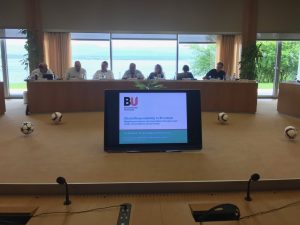
Creating more impact
Next will be to promote the new knowledge throughout academia and practice, and to create further impact on the level of international and national federations as well as club level. Set avenues include:
Tim is a leading expert in corporate social responsibility in sport and, amongst other, the lead guest editor of the European Sport Management Quarterly (ABS 3***) upcoming 2019 special issue “Social Responsibility and the European Sport Context” (http://explore.tandfonline.com/pages/cfp/resm-cfp-social-responsibility-and-the-european-sport-context)
Dr Tim Breitbarth (Principal Academic and Global Engagement Lead, Department of Sport & Physical Activity) is available at tbreitbarth@bournemouth.ac.uk
Final year sport management student Mats Hjertum and his teammate Stian Pettersen from our partner university, the Norwegian School of Sport Science, have been shortlisted in a business competition involving Germany’s most successful football club FC Bayern Munich and global consumer goods giant Procter & Gamble. Teams from as far as New Zealand submitted their innovative ideas around fan experience and mediaisation in football. Mats and Stian are mentored by management academic Dr Tim Breitbarth.
Watch their great team presentation video that prominently features BU by clicking on the below picture.
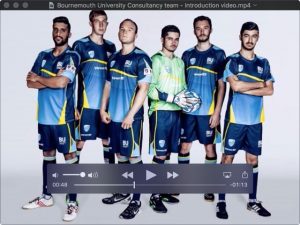
They are now invited to spend four days with FC Bayern Munich around the Audi Cup at the beginning of August (pre-season competition involving Bayern Munich, Liverpool, Atletico Madrid and Napoli) to meet stakeholders of the business competition, including Bayern executive board members, the general manager of P&G Germany, and the managing partners of Futury, the idea generator and test factory for new and digital business models which brokers the business competition. Importantly, Mats and Stian will pitch their idea for substantial funding and mentorship in the final phase. Amongst other, part of their experience will be an exclusive tour of Allianz Arena and tickets for all matches of the competition.
Unfortunately, the second team led by BU sport management student Sahil Kamble did not make the cut despite a strong business, sports and engineering skills portfolio within their team of three and also an exciting technology-driven proposal.
With the initial lead for the competition coming through Dr Carly Stewart, this is the first time Bournemouth University sport students have been involved in such an international business competition. Besides Tim’s mentorship, Mats and Sahil commented that their approach to this competition and their business thinking benefitted from the experience of the intense multi-day and fast-paced international student management game in Cologne, organised as part of their final year strategic sport management unit.
For more information, contact Dr Tim Breitbarth (Principal Academic and Global Engagement Lead, Department of Sport & Physical Activity) at tbreitbarth@bournemouth.ac.uk
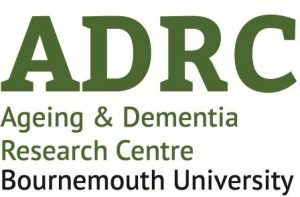
Professor Jane Murphy, Joanne Holmes and Michelle Board supported by Michelle O’Brien hosted the launch of the online version of the workbook ‘Eating and Drinking Well: Supporting People Living with Dementia’ at the Royal College of Physicians, London on 27th June 2017. Attended by leading stakeholders across health and social care, charities including age UK, hospices, WRVS and housing organisations, this impact event explore how good nutrition and hydration can be improved for people living with dementia.
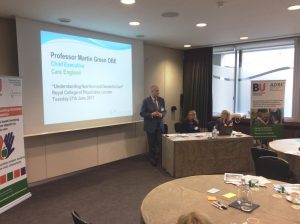
The ADRC was delighted to welcome Professor Martin Green, Chief Executive of Care England who gave an inspiring keynote speech concentrating on the importance of nutrition to ensure dignity in care. He was passionate about the need to raise the profile of good food and nutrition amongst politicians and policy makers to enhance and maintain quality of life for many older people receiving social care. Other speakers included Jan Zietara, Head of Operational Delivery, Health Education England (South) who talked about current work and new developments to enhance the knowledge and skills of the health and social workforce with particular focus on initiatives for dementia education and training. Finally, Kathy Wallis, Senior Programme Manager, Nutrition in Older People Programme, Wessex Academic Health Science Network highlighted the projects, resources and tools undertaken to address the growing concerns of malnutrition (undernutrition) in older people living in the community.
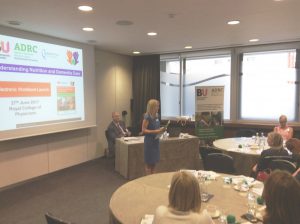
Helped by a lovely afternoon tea, there was active and lively discussion by all participants about how the workbook could help improve the delivery of nutritional care for people with dementia across a range of health and social care sectors. All were very supportive of the training tools and left the event with lots of ideas and identified actions to put into place that would be followed up by the team!
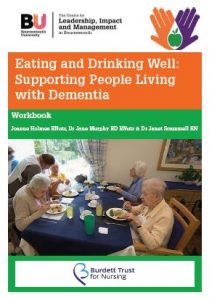 The workbook stems from research funded by the Burdett Trust for Nursing. The workbook is freely downloadable from the website:
The workbook stems from research funded by the Burdett Trust for Nursing. The workbook is freely downloadable from the website:
http://www.bournemouth.ac.uk/nutrition-dementia
It is designed to be used in conjunction with a training film, also available via the website.
Are you interested in getting involved in a museum and university partnership? Do you want to meet and develop potential collaborators in museums, or other institutions and organisations across the UK? Then why not look at signing up for the final Museum-University Partnership Initiative (MUPI) Match Event in London.
There are many benefits to museums and universities working together, from improving audience understanding to developing more effective collections knowledge or interpretation; from inspiring museum audiences with cutting edge research to developing new exhibits and exhibitions; the opportunities are endless.
However, finding a partner and having the resources to explore how you might work together can be challenging. This final MUPI match event draws upon a tried and tested methodology to bring people together to develop new partnerships. Each session involves museum staff, volunteers, and academics working together to find mutually beneficial ideas that they would like to develop together.
This event focuses specifically on some of the most popular themes from our regional Matches that explore the idea of ‘Working Across Boundaries’ in different ways:
Details:
The Cinema Museum, London
26 July 2017, 11am-4.30pm
Registration link: https://www.publicengagement.ac.uk/national-mupi-sandpit-working-across-boundaries-london-26-july-2017
Open to: postgraduate students, postdoctoral and established researchers from any discipline; all museums which are Accredited, Provisionally Accredited, or Working Towards Accreditation; across England.
Funding:
MUPI Match events provide an opportunity for teams formed at the event to bid for funding (of between £500-£1500) from the MUPI Match fund. A pot of £6000 is available for this event. This ‘thinking funding’ will enable people to do desk research; have conversations; travel and attend site visits/meetings; test ideas; and work together to plan their potential project. This thinking funding provides a critical part of the process, helping people to work out if and how to work together and refine their ideas. Teams will be supported to develop their partnership, and find effective ways to fund their project in the future.
How to get involved:
If you work or volunteer in an ACE Accredited museum, or if you are an academic who is keen to develop new partnerships with museums then a MUPI Match event is just what you are looking for! The event is focused on bringing together museums and academics from across England; it is free to participate in; and interactive. Bring your ideas, your energy, and your expertise and prepare to be challenged and inspired. Who knows this could be the beginning of something very special!
MUPI Match events are delivered through the Museum University Partnership Initiative, funded by Arts Council England’s Museum Resilience Fund and developed in partnership with the Share Academy project and Paddy McNulty Associates.
 Do you have exciting research or expertise that you’d like to take out in to the world and share with other people? Or are you keen to get involved with public engagement but have no idea how to get started?
Do you have exciting research or expertise that you’d like to take out in to the world and share with other people? Or are you keen to get involved with public engagement but have no idea how to get started?
If you answered yes to either of these questions, then we have an opportunity coming up that you cannot miss at Bournemouth Air Festival 2017 as we run our very own Science Tent on the promenade in association with the British Science Association and Siemens UK.
We’re looking for a number of hands-on activities and exhibits to join us on the seafront between the 31st August and 3rd September. We are primarily looking for activities that:
If you think you have an activity—or even an idea—that fits this criteria please drop an email to nday@bournemouth.ac.uk to express your interest and we will be able to discuss it further. If your activity doesn’t necessarily meet these criteria, then we’d still love to hear from you to see if it could be suitable for this event, or get you involved with another of our forthcoming public engagement activities.
In addition to looking for activities, we are also looking for passionate individuals from all academic disciplines who would like to try a bit of Science Busking! No previous experience is required as we will be providing full training and be supplying you with the busking materials—all we ask is that you’re a friendly, approachable individual who wants to engage with the public at the Festival. If this sounds like you, again drop an email to nday@bournemouth.ac.uk to register your interest.
MS is a chronic debilitating and progressive condition that affects the fatty tissue sheath surrounding nerves. Incomplete innervation due to loss of the myelin sheath is largely responsible for uncoordinated movements. Brain temperature fluctuations are also often seen in people with MS together with fatigue when carrying out mentally or physically demanding tasks. These are commonly associated with excessive yawning yet the cause of fatigue in MS is not well understood.
A recently completed study asked participants to produce saliva into a small tube so that their cortisol levels could be analysed. They were also asked to look at presentations that provoked a yawning response. Results revealed that all of the participants had elevated cortisol levels after yawning and that there was a marked difference in cortisol levels between the healthy participants and those with MS.

Yawning: Pynq Thompson aged 28 days
Thompson Cortisol Hypothesis (Ref.1) proposes threshold levels of cortisol trigger the yawn response which lowers brain temperature. Correlation between brain temperature and cortisol is to be further examined together with comparison between UK and Norwegian participants with MS since the incidence of MS is greater in Scandinavian countries (and Canada and Scotland) possibly due to vitamin D and K reduction with reduced sunlight.
Previous studies have examined electromyograph (EMG) activity during yawning and manipulation of conditions to provoke yawning (Refs. 2,3). Brain regions and cortisol activity has been identified in MS in an international study (Ref. 4); and a new understanding proposed of communication between the motor cortex and brain-stem (Ref.5).

Yawning EMG “envelope” of activity
A funding bid is being prepared to examine the feasibility of producing the early detection of MS and cortisol-insufficiency syndromes using observed yawning frequency and cortisol levels.
Simon B N Thompson is Associate Professor, Bournemouth University; Visiting Professor, Université Paris Ouest Nanterre La Défense, France. Member of International Scientific Council for Research into Multiple Sclerosis following presentation to French Ambassador, His Excellency Bernard Emié, French Embassy.
Acknowledgements
Thanks to all volunteers; Alister Coleman and Nicola Williams for assisting in data collection and analysis; Rod Slip, Group Co-ordinator and Kay Bundy, Fundraising Co-ordinator of the MS Society Osborne Centre for providing free facilities.
Note
The author would welcome interest in collaborating in writing bids for funding international work.
References
1. Thompson, S.B.N., 2011. Born to yawn? Cortisol linked to yawning: a new hypothesis. Medical Hypotheses, 77, 861-862.
2. Thompson, S.B.N., & Bishop, P., 2012. Born to yawn? Understanding yawning as a warning of the rise in cortisol levels: randomized trial. Interactive Journal of Medical Research, 1(2), e4, 1-9, doi: 10.2196/ijmr.2241.
3. Thompson, S.B.N., Frankham, C., & Bishop, P., 2014. The art of capturing a yawn using the science of nerve impulses and cortisol levels in a randomized controlled trial. Thompson Cortisol Hypothesis as a potential predictor of neurological impairment. International Journal of Arts & Sciences, 7(3), 529-543.
4. Thompson, S. B. N., Daly, S., Le Blanche, A., Adibi, M., Belkhiria, C., Driss, T., de Marco, G., 2016. fMRI randomized study of mental and motor task performance and cortisol levels to potentiate cortisol as a new diagnostic biomarker. Journal of Neurology & Neuroscience, 7(2); 92: 1-8.
5. Thompson, S.B.N., 2017. Hypothesis to explain yawning, cortisol rise, brain cooling and motor cortex involvement of involuntary arm movement in neurologically impaired patients. Journal of Neurology & Neuroscience, 8(1); 167: 1-5.
BU r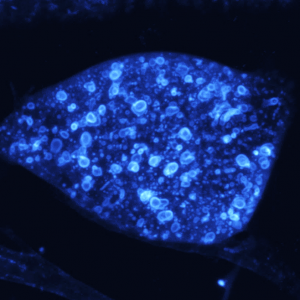 esearch, (led by me, Dr Paul Hartley), was recognised at UK Kidney Week in Liverpool last week. We were invited to speak about our fruit fly model of human renal disease, work that has been variously supported by grants from the British Heart Foundation and Kidney Research UK. The conference was an excellent opportunity to showcase the model and highlight our current collaborations with consultant-scientists based at Great Ormond Street Children’s Hospital as well as a number of different groups at the University of Bristol, the University of Osnabruck in Germany, Harvard Children’s Hospital and the University of Edinburgh. The research work is based in Dorset House labs and is supported by a wide network of talented people within BU as well as our undergrad and post-grad students.
esearch, (led by me, Dr Paul Hartley), was recognised at UK Kidney Week in Liverpool last week. We were invited to speak about our fruit fly model of human renal disease, work that has been variously supported by grants from the British Heart Foundation and Kidney Research UK. The conference was an excellent opportunity to showcase the model and highlight our current collaborations with consultant-scientists based at Great Ormond Street Children’s Hospital as well as a number of different groups at the University of Bristol, the University of Osnabruck in Germany, Harvard Children’s Hospital and the University of Edinburgh. The research work is based in Dorset House labs and is supported by a wide network of talented people within BU as well as our undergrad and post-grad students.
 On Wednesday 28th June, the Writing Academy will be hosting a Lunchbyte session with Sara Ashencaen Crabtree. During the session Sara will talk about her personal publishing experience, her approaches to research and writing, her tips on developing a publication strategy, working with co-authors, reviewers and editors. She will talk about all types of publishing drawing on personal experience, focusing on international reach.
On Wednesday 28th June, the Writing Academy will be hosting a Lunchbyte session with Sara Ashencaen Crabtree. During the session Sara will talk about her personal publishing experience, her approaches to research and writing, her tips on developing a publication strategy, working with co-authors, reviewers and editors. She will talk about all types of publishing drawing on personal experience, focusing on international reach.
Aims:
BU academic presented at ‘Belonging in a post-Brexit-vote Britain: researching race, ethnicity and migration in a changing landscape’ conference at the University of Sheffield (co-organised by the British Sociological Association and the Migration Research Group)
I presented an on-going project, Migrant and Refugee Leisure Spaces and Community Well-being at ‘Belonging in a post-Brexit-vote Britain: researching race, ethnicity and migration in a changing landscape’ conference at the University of Sheffield in May. A report of the conference can be found here: https://www.sheffield.ac.uk/socstudies/scsnews/bsa-migration-conference-1.701133
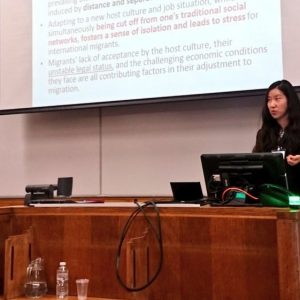
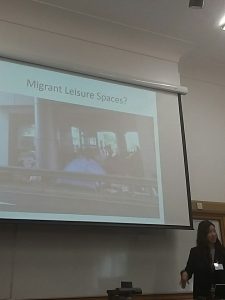
[Dr. Jaeyeon Choe, Senior Academic presenting at Sheffield]
The ‘Migrant and Refugee Leisure Spaces and Community Well-being’ presentation got much interest from the audience, who were primarily sociologists. Discussions flowed around “how” leisure spaces and practices can help migrants integrate into communities and enhance their well-being, and how migrants define social inclusion, integration and well-being differently from scholarly (often middle class and ‘white’) definitions. Other discussions surrounded how some cultures have segregated and have ‘invisible’ leisure spaces whilst others prefer generic space to gather.
Prof. Louise Ryan in Sociology at University of Sheffield emphasised that we need to develop comparative lenses and more holistic and international perspectives from different scales. We need to talk across fields and disciplines to move forward to understand migrants’ lives, well-being and integration.
“The impact of the referendum, means that researchers on intra-EU migration, those working on refugee studies and on ‘race’ and ethnic studies, need to come together to share insights and collaborate to develop new analytical frameworks to understanding the evolving implications of Brexit.”
The tourism and leisure field has much to offer and contribute in the exploration of migrant lives and their integration in the UK. Existing research suggests that leisure spaces provide migrants with opportunities for developing, expressing and negotiating their personal, social and cultural preferences safely whilst gaining recognition and a sense of belonging. This is especially important as they may confront issues relating to belongingness, societal membership, social status, self-perception and cultural confusion. Leisure can be instrumental to (re)establishing connections and networks with locals as well as other migrants and refugees, and provide spaces for problem solving. Leisure opportunities and spaces support the development of cultural capital to allow migrants to feel safe enough to contemplate building a productive life. Thus, leisure spaces can play an important role in integration. The role of leisure in integration also reflects the receiving community feeling unthreatened by migration.
I also participated in an Early Career Researcher Mentoring session with Prof. Louise Ryan during the conference. I found the session very useful as I received advice on research, publishing and networking in the migration studies field and beyond. Prof. Ryan also shared helpful insights and advice on career development strategies in the UK, especially for migrant young female researchers with similar profiles to me. This was an unusual programme during an academic conference that can be widely utilised by other conference and workshop organizers. I found the session extremely helpful in aiding my understanding of the academic culture in the UK and how to adapt to it as a young researcher from a migrant background.
https://www.britsoc.co.uk/about/latest-news/2017/may/mentoring-caf%C3%A9-it-isnt-just-chatting-over-coffee/?utm_source=newsletter&utm_medium=email&utm_campaign=may_news&utm_content=louise_ryan
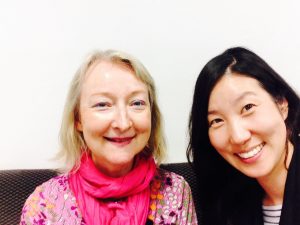
Another interesting feature of the conference was a photographer as a keynote speaker. Jeremy Abrahams (theatre & portrait photographer) shared powerful visual work of the impact of Brexit entitled, ‘Remain/Leave’.
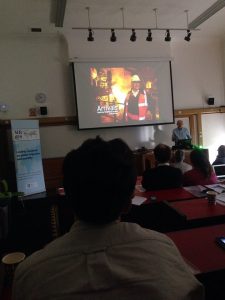
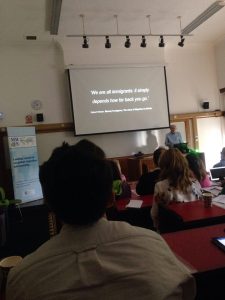
A keynote by Dr. Jon Fox at University of Bristol emphasised ‘Everyday Racism’ and how it has increased after the EU Referendum. He discussed pathological integration: East Europeans, racism & becoming British.
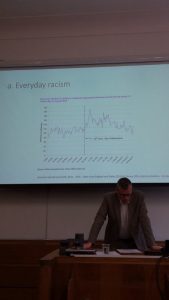
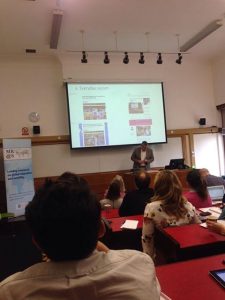
Finally, fellow conference delegates took photos of my presentation and posted them with useful comments/questions on the conference twitter page. After I mentioned a Bourenmouth University migrant well-being project twitter account, 10 immediately followed us, and had led to interesting and useful connections with fellow researchers with similar interests. 🙂 It was not only productive in getting feedback and comments on our on-going research project, but also great to meet migrant studies researchers to network.
For more information about our migrant and refugee leisure spaces and community
well-being project, please follow the Facebook Group: ‘Migrant Leisure Spaces’, Twitter: @migrantspaces and the project web page: https://research.bournemouth.ac.uk/project/migrant-refugee-leisure-wellbeing/

Images from the Capturing Event Impacts presented by Dr Nicole Ferdinand at the Sussex Impact Day
Dr Nicole Ferdinand, Senior Academic Events Management, was one of the presenters at the Sussex Impact Day, at University of Sussex, Attenborough Centre for the Creative Arts, Falmer, Brighton, June 13th 2017. Her presentation on Capturing Event Impacts by Developing an Event Profile was one of three sessions which were dedicated to Understanding Event Impacts. It was praised for providing useful “practical information” to University of Sussex Academics, who were increasingly “using events to accelerate the impacts of their research” by Megan McMichael, ESRC Impact Acceleration Account (IAA) Project Manager at Sussex University. Key insights from her presentation included: the need to have a dedicated budget to capture impact; the increasing importance of capturing social media impacts and incorporating automation or e-evaluation tools to make event impact capture easier.
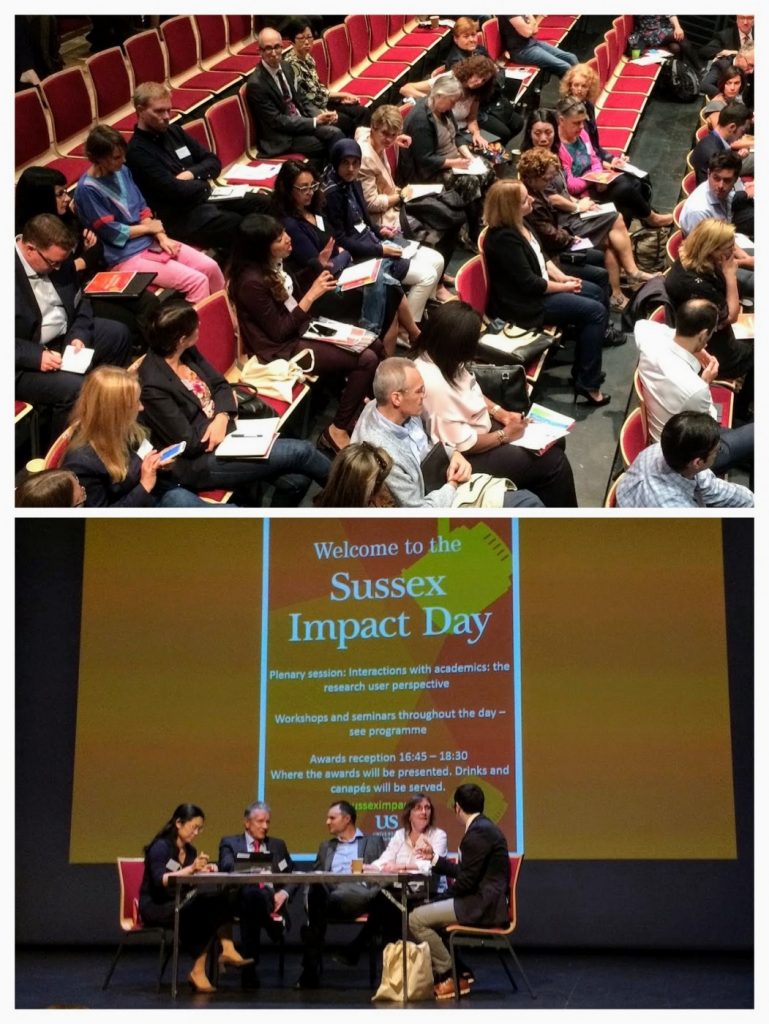
Images from the Plenary Session at the Sussex Impact Day
The University of Sussex Impact team also invited Dr Ferdinand to join other sessions at the Impact Day, including the plenary session featuring external organisations who have first hand experience of working with academics. The speakers were Mr Antonio Capillo, Senior Monitoring, Evaluation and Learning Manager at The Fairtrade Foundation, Ms Tao-Tao Chang, Research Grants manager at The Victoria and Albert Museum, Dr Penny Hawkins, Head of Research Animals Department at the RSPCA and Dr Malcolm Skingle, Academic Liaison Director at GSK.
For more on the Sussex Impact Day have a look at a summary of the day’s events and Dr Ferdinand’s session on Capturing Event Impacts on Storify.